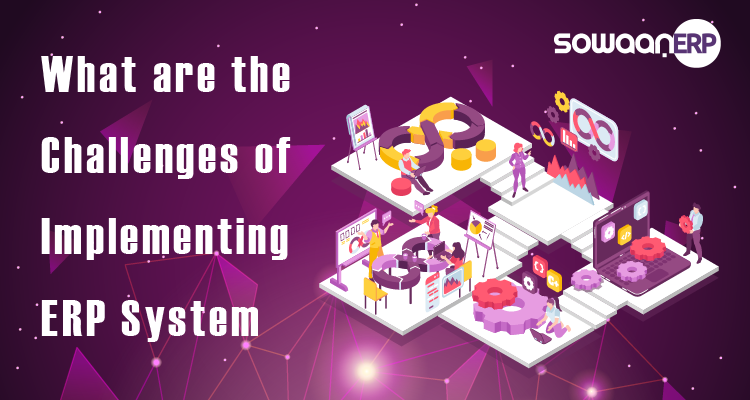
Implementing an ERP System can be a challenging process. While it offers countless benefits, businesses often encounter hurdles along the way. As you consider investing in the best ERP system in Saudi Arabia, it’s essential to understand these challenges and how to overcome them. This process involves selecting a suitable solution, managing change within the organization, ensuring data integrity, and training staff effectively. However, with a well-structured implementation plan, strong leadership, and dedicated resources, these obstacles can be navigated successfully. Once implemented, these systems can revolutionize business operations, leading to improved efficiency, better decision-making, and increased profitability. Furthermore, they can foster greater collaboration across different departments, streamline workflows, and provide valuable insights through comprehensive reporting. In essence, a successful ERP implementation can be a game-changer for your business, setting the stage for sustained growth and success.
Understanding the challenges of an ERP system
The first challenge businesses face is the complexity of the ERP System. It’s not just about installing software; it’s about transforming the way your business operates. This transition can be overwhelming for staff, leading to resistance and slow adoption.
Secondly, data integrity issues may arise. The ERP System needs accurate data to function effectively especially for intraday trading strategies. However, data migration from old systems often leads to inconsistencies and errors that can cripple the system’s efficiency. Furthermore, the integration of various business functions into a single platform can be daunting and time-consuming. Additionally, ensuring compatibility between the this system and existing business practices is crucial for seamless operation. Lastly, the initial cost of implementing this system can be substantial, making it a significant investment decision for many companies.
Key features of the best ERP system in Saudi Arabia
To navigate these challenges, you should search for the key features of the best ERP system in Saudi Arabia. A top-notch system will have features such as real-time data analysis, a user-friendly interface, and robust security measures.
Moreover, the right ERP system in Saudi Arabia will offer comprehensive training and support to ensure smooth implementation and adoption. It will also provide data cleaning and validation tools to maintain data integrity. And one such system is SowaanERP. Known for its adaptability and scalability, SowaanERP caters to businesses of all sizes. It offers modules for every business function, ensuring a comprehensive solution for your organization. Its advanced analytics provide actionable insights that can drive your business forward. Additionally, SowaanERP prioritizes customer support, offering round-the-clock assistance to its users, making it a highly recommended option when looking to invest in an this system.
Case Studies on the best ERP system implementations in Saudi Arabia
Looking at case studies on the best ERP system implementations in Saudi Arabia can provide valuable insights. These studies reveal common pitfalls and successful strategies employed by businesses. They underscore the importance of careful planning, effective communication, and continuous training in a successful implementation of this system. Moreover, they highlight the significance of selecting an ERP system that aligns with your specific business needs and goals. These case studies also illustrate how companies have navigated data migration issues and managed organizational change. They serve as practical guides, offering lessons learned and best practices to follow when implementing your own system of ERP. Furthermore, these studies emphasize the critical role of leadership commitment and cross-functional collaboration in ensuring a smooth and successful ERP implementation.
Overcoming ERP implementation challenges
Overcoming these problems requires a strategic approach. Firstly, invest in staff training to ensure your team understands the new processes and systems. Secondly, work closely with your ERP System provider to clean and validate your data before migration. Finally, ensure you have a strong change management plan in place to drive acceptance and adoption. In addition to these steps, it’s crucial to maintain open communication channels throughout the process to address concerns promptly. Also, engage key stakeholders early in the decision-making process to gain their buy-in. Regularly reviewing and adjusting your implementation strategy based on feedback and performance can also lead to more effective results. Remember, patience and persistence are key as the benefits of an this system often become evident over time.
Conclusion
While there are challenges associated with implementing an ERP System, the benefits far outweigh the difficulties. By understanding these problems and their solutions, you can ensure a successful implementation. An effective ERP solution and system streamlines your business processes, reduces operational costs, and improves productivity. It provides real-time data analysis, enabling informed decision-making and strategic planning. Furthermore, it enhances customer service through improved responsiveness and order fulfillment. These advantages contribute to increased competitiveness and growth for your business in the long run. So, when you’re ready to transform your business operations and propel your business toward greater success, make sure to buy the best ERP system in Saudi Arabia. Remember, a well-implemented ERP solution is not just an investment in technology; it’s an investment in your business’s future.
